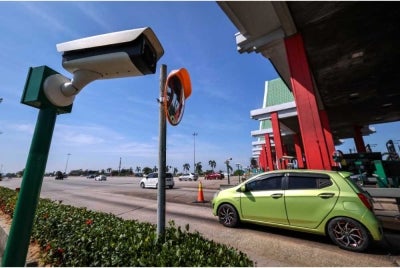JMBs responsible for installing CCTVs, heightening safety

SHAH ALAM - The responsibility for ensuring every residential area in Malaysia, including low-cost flats, has CCTV for safety monitoring should primarily lie with the joint management bodies (JMBs) of these locations says elected officials.
Speaking to Sinar Daily, Sungai Pinang assemblyman Lim Siew Khim stressed essential role of management entities in prioritising the installation and maintenance of CCTV systems within their buildings as a crucial measure for enhancing security and safety.
"In my view, the responsibility of ensuring that every residential area in Malaysia, including low-cost flats, is equipped with CCTV for safety monitoring should primarily fall on the management bodies of these residential locations.
"It is essential that these management entities prioritise the installation and maintenance of CCTV systems within their respective buildings. This approach is crucial for enhancing the security and safety of residents," she said.
Lim also said that installing CCTV in residential areas, especially in low-cost flats could contribute to community safety by combatting criminal activities and enhancing safety among residents.
"Installing CCTV in residential areas can significantly contribute to community safety by deterring criminal activities, aiding in crime investigation, enhancing public security, and fostering a sense of safety among residents.
"This surveillance can also assist in monitoring and responding to emergency situations promptly," Lim said.
She added that the surveillance systems could also play a vital role in monitoring and responding to emergencies promptly.
Meanwhile, Subang Member of Parliament Wong Chen echoed the same sentiment highlighting the practicality of CCTV as a crime prevention tool in collective living spaces such as flats and condominiums.
Wong suggested the government step in to provide grants in low-cost flats, where crime rates are notably high and many JMBs or Resident Associations (RA) struggle to collect maintenance fees.
"The crime situation in low-cost flats is very bad, and the vast majority of these JMBs or RAs can hardly even collect 30 per cent of the maintenance fees, what more invest in CCTV systems," Wong said.
Therefore, he proposed a data-driven approach, recommending that the government analyse crime data, calculate costs, and identify the most vulnerable low-cost flats.
Wong further recommended a trial period, suggesting that the government allocate a modest budget for a one-year implementation trial in 10 low-cost flats.
"The government should crunch the crime data, calculate the costs and identify the most vulnerable low-cost flats.
"Then it should set a modest budget, run an implementation trial period of one year for 10 low-cost flats, study the outcomes in terms of costs and drop in crime rate.
"If the trial is successful, then the government can consider a larger rollout in the following years," he said.
While acknowledging the potential benefits of subsidising CCTV packages for flats and apartments, elected officials, including Lim and Wong argue that more effective use of government resources might involve alternative strategies to encourage management bodies to install and maintain these systems.
"Collaboration with local authorities such as the police or local councils (PBT) could be explored to amplify security measures in areas where CCTV is already in place," they said.
Download Sinar Daily application.Click Here!















